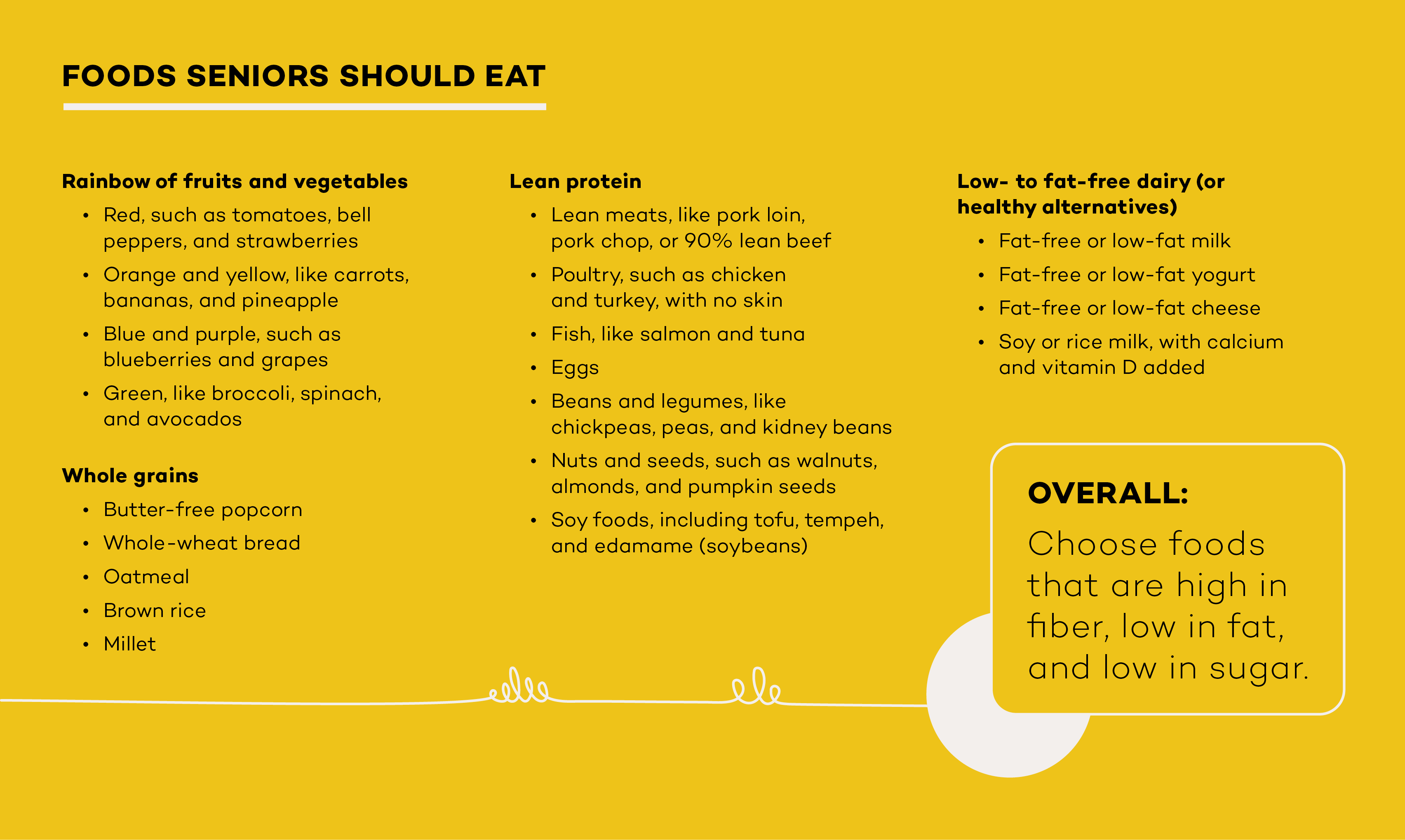
While the need to eat foods that are good for you never changes, you must make some modifications to meet your nutritional needs as an older adult. Use these healthy eating tips for seniors to stay well as you age.
If you’ve heard that your metabolism slows as you age, you heard correctly. A major cause of this is loss of muscle mass, which happens gradually over the years. With less muscle demanding calories for energy, you may need to cut back on your caloric intake to maintain your weight. That’s because excess calories turn into fat.
One way to be successful is to avoid foods and drinks with empty calories as often as possible. These include items with solid fats and added sugars, such as sodas, packaged cookies, cheese, sausage, fast food, and candy.
Even though you must reduce your consumption of some foods, you still have a variety of nutritious options to enjoy. In fact, a well-balanced diet calls for a range of choices from the main food groups. It ensures you have the nutrients you need to keep moving and be healthy. For example, complex carbohydrates, like brown rice and whole wheat pasta, can satisfy your need for grains, which provide energy, healthy digestion, and improved metabolism.
Learn exactly what amounts of which foods you should be eating per day, as well as your suggested caloric intake, when you use the USDA’s free MyPlate Plan program. When you go shopping for your recommendations, you’ll find it’s easy to get these foods for seniors at budget-friendly prices.

As one of the main food groups, protein is something you should be having at every meal. Your need for it nearly doubles as you grow older, since it helps combat your loss of muscle mass. Because muscle is necessary to maintain your balance, eating protein is among the top healthy eating tips for seniors.
It is recommended that, once you turn 50, you eat 1.2 grams of protein or more per every 2.2 pounds of your body weight. That means, if you weigh 165 pounds, you need 90 grams of protein each day. That may sound tough, but your many options for protein, whether for meals or snacks, can include:
One of the most important health tips to remember if you exercise regularly — consume protein shortly after your workout. It’ll give your muscles what they need to get stronger.
Your need for certain vitamins and minerals to fight off issues that may occur with age will increase. Fortunately, these can be obtained when adhering to a balanced diet or one of the appropriate diets for people over 60.
However, it may be challenging to get the nutrients you need if you have low stomach acid or a digestive disorder that affects your ability to absorb them. In either case, it’s a good practice to discuss with your physician whether you need to take supplements for any of the following special needs, such as:
Your body has done an excellent job of letting you know when you’re thirsty over the years, so you may not notice when its ability to do so weakens. This naturally happens with age. Without proactive measures, dehydration can occur and affect everything from your mobility to blood flow and cause a host of other issues.
While you may get some fluids through other beverages and foods, such as fruits, vegetables, or soups, it’s important that you plan to drink six to eight cups of water every day. If you need help meeting this goal, try adding fruits or herbs, like lemon and mint, to make water more appealing, and always keep a glass near you.
Some processed foods may offer health benefits, such as extra virgin olive oil and whole wheat bread. However, products that have undergone “ultra-processing,” like packaged snacks, sodas, margarine, and ice cream should be avoided. These foods contain added sugar, fat, and sodium, which cause you to ingest empty calories. They’ve also been linked to 32 health issues.
It’s important that you understand how to read the Nutrition Facts label to recognize ultra-processed foods. There, you’ll find the amounts of sodium, fat, and added sugar that are included (look for low to zero values for each). You should also examine the ingredient list. The foods with the least ingredients will be the least processed. The easiest and healthiest strategy is to choose whole foods — or foods that are in their natural state — such as fruits, vegetables, and whole grains.
While extra virgin olive oil is said to promote good health, other cooking oils have the opposite effect.
Corn oil, soybean oil, and peanut oil contain unhealthy amounts of omega-6 fatty acids, which may cause inflammation. They may also have polyunsaturated fats that can result in cell damage. You may find foods that list hydrogenated or partially hydrogenated oils in their ingredients, avoid these as well. They contain trans-fat that could be detrimental to your heart health.
For your healthiest options, choose olive oil or avocado oil.
Food poisoning becomes more dangerous for older adults. If you’re a senior, your immune system isn’t as strong, and bacteria may grow in your body due to its decreased abilities to get rid of it. If you have a chronic health issue, you could be at greater risk of serious illness or even hospitalization.
The U.S. Department of Health and Human Services recommends that you separate raw meat and poultry from other foods and keep them chilled until cooked. Then it suggests cooking them to appropriate temperatures. These measures can prevent or kill bacteria, parasites, and other substances to ensure your food, and you, are safe.
Photo credit: iStock
Wellabe offers life and supplemental health insurance plans to help you prepare for good days and bad. We’ll always be here to empower you to be well — well prepared, well protected, and well loved.